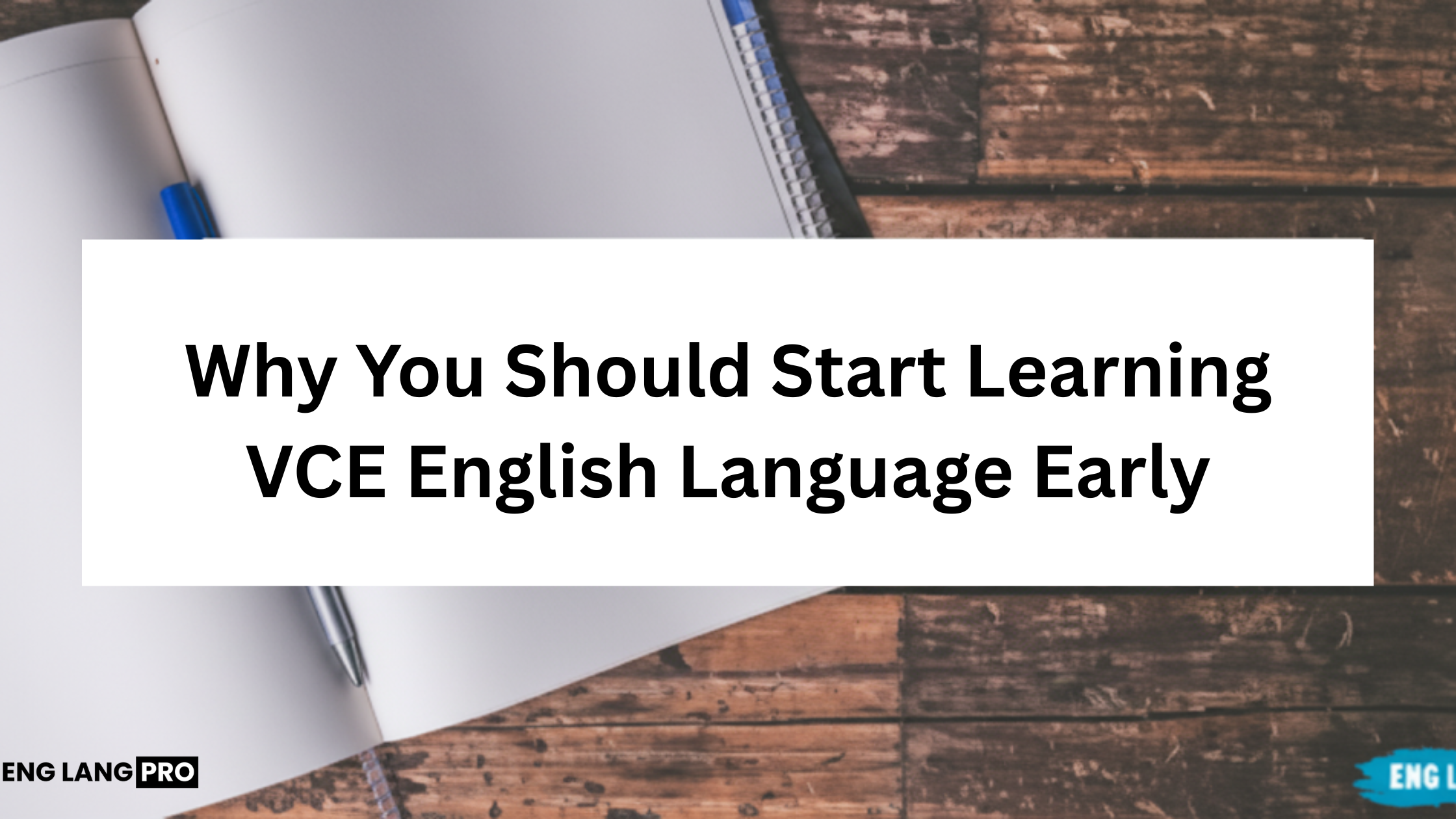Why You Should Start Learning VCE English Language Early
Introduction
Most students don’t think seriously about VCE until they hit Year 11. By then, the workload suddenly feels overwhelming — essays, SACs, and revision all stack up at once. For subjects like English Language, this last-minute approach can make things even harder.
Starting VCE English Language early gives you a real advantage. Unlike English or Literature, it’s a technical and analytical subject that requires you to master metalanguage, commentary writing, and essay structures. These are skills you can’t cram the night before a SAC. They need time, practice, and confidence.
In this guide, we’ll unpack why preparing early matters, the biggest benefits of building your foundation now, and practical steps you can take to get ahead. By the end, you’ll see that starting early isn’t about doing “extra work” — it’s about making Year 12 smoother, less stressful, and much more rewarding.
Why Early Preparation Matters
English Language isn’t just about “reading and writing” like mainstream English. It’s a linguistics-based subject that asks you to analyse how communication works — from phonology and syntax to social contexts and discourse patterns. That means you’ll need to learn technical terms and apply them accurately in short answers, essays, and analytical commentaries.
Unlike Literature, where interpretation can be more subjective, English Language rewards consistency and precision. You can’t bluff your way through; you need the terminology and the skills to back it up.
This is why starting early makes such a difference:
✅ Less stress when you hit Units 3 & 4
✅ A stronger foundation for SACs and the final exam
✅ Confidence using terminology in context
If you’re curious, check out the official VCE English Language study design to see exactly what’s expected across Years 11 and 12.
Key Benefits of Starting VCE English Language Early
3.1 Build Confidence with Metalanguage
Metalanguage is at the heart of this subject. From phonology to semantics, you’ll be expected to use precise terms in every exam section.
Starting early means you can learn terms gradually rather than scrambling to memorise them all in Year 12. For example, if you already know what nominalisation is in Year 11, by the time you hit Year 12 it will feel second nature to use it in commentary and essay responses.
3.2 Master Analytical Commentary Skills
Ask any past student and they’ll tell you: commentary is the hardest part of the exam. Why? Because you have to produce a detailed, structured analysis in just 45 minutes.
Starting early gives you time to practise analysing register, tenor, function, and purpose without the pressure of exams hanging over you. You’ll also develop a sense of how to structure your commentary clearly.
For a step-by-step breakdown, see our analytical commentary writing guide.
3.3 Stronger Essay Writing
VCE English Language essays aren’t like mainstream English essays. You’ll need contemporary examples (politics, social media, slang, Indigenous languages) and links to linguistic theory.
If you start early, you can slowly build an examples bank. That way, when you’re in Year 12, you won’t be scrambling to find quotes or real-world references — you’ll already have a set of polished examples ready to go.
3.4 Better Time Management
The English Language exam is strict on timing. Section A SAQs, Section B commentary, and Section C essay all demand different skills within limited time.
By practising short answers and timed writing early, you’ll train yourself to write fast but precise. That time management practice will also help in other VCE exams.
3.5 ATAR Advantage
Finally, don’t forget scaling. English Language is known to scale up well, meaning strong performance can boost your ATAR. Starting early increases your chance of hitting those higher scores because you’ll be more consistent across the year.
Practical Ways to Start Learning Early
If you’re in Year 10 or early Year 11, you don’t need to “study like it’s Year 12” — but you can set small, regular habits that make a big difference later.
Here’s how:
Read widely → speeches, ads, transcripts. Annotate them for features.
Build a metalanguage glossary → use flashcards, colour-coded subsystems.
Practise SAQs → start with past exams and focus on conciseness.
Essay drills → unpack prompts, jot down contention + 3 examples, even if you don’t write the full essay.
Study groups → teach each other concepts; explaining out loud helps lock it in.
Use resources → teachers, tutors, and free VCE English Language resources can save you time.
Sample Weekly Plan (Year 10/Early Year 11)
| Day | Time | Task | Example Goal |
|---|---|---|---|
| Monday | 4–4:30 PM | Metalanguage flashcards | Revise 5 new terms |
| Wednesday | 4–5 PM | Transcript annotation | Identify discourse features |
| Friday | 4–4:30 PM | SAQ practice | Write 1 short-answer response |
| Saturday | 10–11 AM | Essay planning | Outline contention + 3 examples |
Even half an hour a few times a week builds habits that will make Year 12 so much easier.
Common Myths About Preparing Early
“It’s too early, I’ll forget everything by Year 12.”
Wrong — skills build gradually, and repetition locks them in.
“I don’t need metalanguage until Year 12.”
Incorrect — Units 1 & 2 already test metalanguage heavily.
“Starting early means I’ll burn out.”
Not if you pace yourself. Small, regular practice is far more sustainable than cramming.
Conclusion
English Language is one of the most unique VCE subjects. It’s not harder than English or Literature — but it is different. It rewards consistent practice, strong terminology, and analytical thinking.
By starting early, you’ll avoid the Year 12 scramble, build real confidence, and give yourself the best chance of success.

